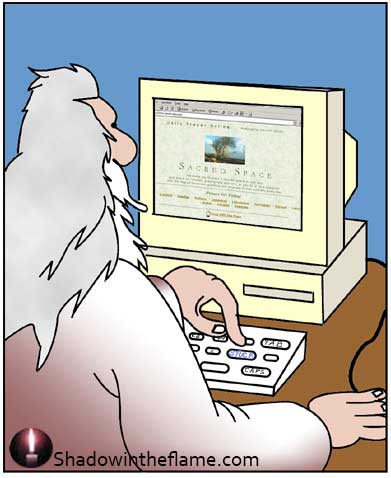Craig Venter explains genetic modification
Is Craig Venter a God?
If we pray to God because “he created us”, who should the species that scientists create pray to?
 God at his computer
God at his computer
Scientists may say we don’t need to answer that while we are creating microbes, but what happens when we develop the ability to string together the code for 3 billion bases and produce our first “human”?
However, long before we create a human from scratch, we will have developed the ability to genetically modify babies. Who is the God when we engineer a fetus to produce “children to order” whether to insert a specific trait such as immunity to a virus or to delete an inherited gene that causes a disability? This question is just as relevant if you have the technology available to do it, but choose not to or if you use the technology to do it.
At What Point, Do You Become God?
So the question arises, when do you become a God? Is it when you create a single cell life form or must you wait until you have created a complex human life form? Or is there some halfway point at which this event happens? I find it hard to justify distinguishing between the point where we create single cell life and a complex one.
The question is not merely one of hypothetical speculation any more. The science is here, the technology just needs to be refined.
What will be the position or the status of species, especially complex species that may resemble humans, if not actually be human that are created by man to serve his needs? Whatever we call them, will they be slaves?
Apart from all the economic arguments regarding why slavery is not an efficient way to organise an economy, the ethical argument against slavery was basically that all humanity is created equal in the eyes of God. If we assume there is a God, then no matter who creates the species, surely they are our equals in God’s eyes. Therefore, the answer must be that they have equal rights. Of course, that argument could equally apply to animals.
Is It Ethically Acceptable to Create A Slave?
But if we prove that life was created by a one in a billion chance chemical reaction, does that change the philosophical position on the equality of humans, or man versus animals or vis-à-vis a species of human like “Hubots” that are created by man?

A long held belief in God has not endowed animals or the many disadvantaged humans with equal rights, so what will happen when we take God out of the equation? Is it ethically acceptable that if man can create a form of human that has similar traits to a human (a Hubot) that is genetically programmed to serve man’s needs, should he do so?
Will we regard this species as human, animal or android? Should it make any difference?
What if that species looks human, breathes air like us, has a human life span and dies like us? If it eats, feels pain and bleeds like a human? What if it has feelings? Is it ethical to produce a species that has a brain and can learn but is genetically programmed to be a servant or a soldier or a baby maker?
In this experiment, Venter’s team injected synthetic DNA into a living cell and watched it take over that cell and ultimately wipe out the previous DNA. The cell then turned blue, which the new DNA was programmed to do when it took control of the cell.
The aim is that one day we can inject DNA into a cancer cell and watch it self-destruct. I’m sure everyone would say that’s great. How would we feel about injecting a male with DNA code and watch him turn into a female or vice-versa? Some would prefer this to the current situation, which requires surgery and drugs to achieve a partial solution.
The options are endless but at what point are they the person God created or the person Craig created? Or do we do away with the notion of God?
Bad With God – What Will We Be Like Without God?
In this increasingly secular world, some would say that it doesn’t matter if you take God out of the equation, but until we can formulate a better foundation for an effective ethical and moral code, we should not rush to throw out the old. Archimedes said it eloquently when he cried, “Give me somewhere to stand and I shall move the earth”. Unfortunately, secular humanists have yet to create a philosophy anywhere near as motivating as a faith in God which can move mountains.
This is the challenge that we now face, to find a philosophy that can move men to put their own self-interest aside for the benefit of all humankind. A philosophy that can give them a basis on which to build an ethical, moral code to live by and still give them enthusiasm for life.
Unfortunately, even as believers in God, we have still not reached a philosophical position of full equality among all members of the human race as we know it, so how will we incorporate these new man made species when they come? And they will come. The only question is when?
My prediction is that our attempt to address these issues will have consequential effects on our views about race, human equality, the rights of women and children, minorities and even animals.
This debate could be the impetus that we have needed from the beginning to approach a worldview that is more encompassing, fair and compassionate for all.
But it will probably mean that we never get that slave, or, maybe, that once again, more people will be in danger of becoming one.
When it comes to making the important decisions that affect our future, our track record so far is 50:50 at best.

